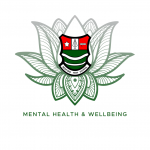MENTAL HEALTH & WELLBEING

Mental health is defined as a person’s mental and emotional ability to make a full and positive contribution to the society in which they live in.
The school aims to increase the level of awareness and understanding of young people’s mental health and well-being. The school aims to detect and address problems in the earliest stages and nurture effective working relationships with external agencies outside school that support mental health and well-being.
Mental Health Facts and Figures
- 1 in 6 people aged 5-16 have clinically diagnosed mental health problems, while 1 in 6 has an emergent or less severe mental health issue.
- The peak age of onset of mental health difficulties is 14.5 years.
- Mental health and wellbeing in adolescence predicts adult health, labour market and other important outcomes.
- The wellbeing of adolescents has decreased in the last two decades, while the prevalence of mental health difficulties among them has increased.
- A recent international study ranked the UK’s young people fourth from bottom across nearly 80 countries in terms of life satisfaction.
- Young people’s mental health and wellbeing can be influenced by multiple drivers, including their health and routines, hobbies and entertainment, relationships, school, environment and society, and how they feel about their future.
Pressures on Young People
Some students may have a genetic predisposition to mental health problems, but there are also many pressures that might be placed on young people from external forces that may cause them to struggle with their well-being:
- loss or separation – resulting from death, parental separation, divorce, hospitalisation, loss of friendships (especially in adolescence), family conflict or breakdown that results in the child having to live elsewhere, being taken into care or adopted;
- life changes – such as the birth of a sibling, moving house or changing schools or during transition from primary to secondary school, or secondary school to sixth form;
- traumatic events such as abuse, domestic violence, bullying, impact of social media, violence, accidents, injuries, natural disaster or a pandemic.
All students receive one 30min form time lesson each week on mental health and wellbeing education. We also run awareness weeks during the academic year and fundraise for different charities linked to Mental Health and Wellbeing e.g. Young Minds.
Through the curriculum, students are taught how to:
- Build self-esteem and a positive self-image.
- Foster the ability to self-reflect and problem-solve.
- Protect against self-criticism and social perfectionism.
- Foster self-reliance and the ability to act and think independently.
- Create opportunities for positive interaction with others.
- Get involved in school life and related decision-making.
To discuss your child’s mental health and wellbeing please contact your child’s Pastoral Guidance Officer (PGO) via email or telephone.
Other places to get help and further advice
https://www.nhs.uk/mental-health/
https://www.mind.org.uk/information-support/a-z-mental-health/
https://www.youngminds.org.uk/
Where do I go for help?
You can speak to any adult at BHS who wears a green lanyard and they will know how to help.
If you are finding it difficult to cope, you feel overwhelmed, or are concerned about someone else, please speak to an adult in school. You may feel comfortable talking to your Form Tutor or a member of the Pastoral Team. The School Nurse (Mrs Morey) is also available every Monday and Friday at lunchtime. This is a drop in clinic just for students. The nurse is an expert who can talk to you and who is dedicated to helping those like you. You are not alone.
The following staff members would be the ideal first points of contact for you. Pastoral Team – Pastoral Guidance Officer or Pastoral Manager/ Form Tutor
Designated Safeguarding Leads
Mrs Ramsden (DSL)
Mrs Moss (Deputy DSL)
Mr McCaffery (Deputy DSL)
Miss Critchley (Safeguarding Mentor)
Sefton School Nurse
Mrs Morey
(Monday and Friday lunchtimes drop in sessions)
Senior Mental Health Lead
Mrs Madden
Anna Freud National Centre for Children and Families
- Self Care – tools and strategies to promote well-being from Anna Freud
- On my Mind – empowering resources to promote positive mental health and well-being from Anna Freud
Support for Sexual Harassment and Abuse
- BBC Action Line – information and support regarding sexual abuse and violence
- Rape Crisis England & Wales – sexual violence information and support
- Mind.org – guide to support options for abuse.
Useful Websites and Resources
- Anna Freud National Centre for Children and Families – support for children / families with mental health problems
- Anxiety UK – self help and contacts for those with anxiety disorders
- B-eat – the UK’s leading charity supporting those affected by eating disorders and campaigning on their behalf
- Campaign against Men Living Miserably (CALM) – targeted at men aged 15-35
- Charlie Waller Memorial Trust – awareness, information and resources for those who are depressed
- Childline – information, advice and emotional support for young people
- Coping with exam anxiety – a FHS resource
- Coping with Self Harm – A parent’s guide
- GetSelfHelp – self help website for ADHD, anger, anxiety, pain, suicidal thoughts, depression, flashbacks, self-esteem, OCD, panic, problem solving, psychosis, relationships
- Hope Again – bereavement support for young people
- Kooth – online counselling support for young people
- Marie Collins Foundation – UK charity enabling children who suffer sexual abuse and exploitation via internet and mobile technologies to recover, live safe and fulfilling lives
- MentalHealth.org
- MYA – Merseyside Youth Association support for young people, advice and guidance
- Mind – the mental health charity for children and young people
- Mindful – an online service for people aged 11-17 providing support, information and advice about mental health and well-being
- Moodjuice – self help website for young people with depression, anxiety, anger, panic, stress bereavement, phobias, traumatic stress, sleep problems, obsession and compulsions
- No Panic – a website and telephone helpline (0808 138 8889) for anxiety disorders and panic attacks (10am to 10pm daily)
- Online Gaming – FHS advice letter
- OCD Action – information and support for OCD and related disorders such as Body Dysmorphic Disorder
- Papyrus – suicide prevention charity
- Hopeline UK – a specialist telephone services providing professional support, advice and information to teenagers through to age 35
- Rethink.org – help and support for people affected by mental illness
- Samaritans – emotional support at any time (116123)
- SANE – a mental health charity offering emotional support, research and campaigning
- SelfHarm UK – dedicated to supporting young people impacted by self-harm
- Stamp Out Suicide – points of contact for those feeling emotionally vulnerable
- Stem4 – teenage mental health charity aimed at stemming commonly occurring mental health issues at an early stage
- Students Against Depression – information and help for anyone feeling depressed, aimed particularly at students
- Depression in Teenagers – self help strategies for those with depression and/or their friends
- Voicecollective – support for young people who hear voices, see visions or have unusual sensory experiences
- Young Minds – support for parents and young people in relation to mental health
- Youth Health Talk – video interviews with young people’s experiences of depression
- The MindShift App
Struggling with anxiety? Tired of missing out? There are things you can do to stop anxiety and fear from controlling your life. MindShift is an app designed to help teens and young adults cope with anxiety. It can help you change how you think about anxiety. Rather than trying to avoid anxiety, you can make an important shift and face it. MindShift will help you learn how to relax, develop more helpful ways of thinking, and identify active steps that will help you take charge of your anxiety.


